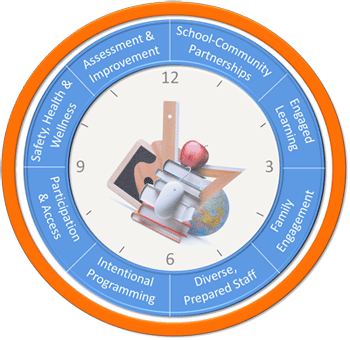At a minimum, expanded learning time programs should go beyond simply adding additional time to the school day and incorporate successful afterschool practices: engaging students in their own education by providing hands-on, experiential learning opportunities through community partnerships that build on—but do not replicate—learning that happens during the school day.
The Afterschool Alliance has created a publication to define and outline the eight principles of afterschool best practices key to developing successful expanded learning programs. Below, we’ve also compiled a variety of additional perspectives, evaluations and analysis from our own resources as well as from outside sources to provide you with a comprehensive guide to this model of expanded learning.
Eight Principles of Effective
Expanded Learning Programs
 |
Principles of Effective Expanded Learning Programs: A Vision Built on the Afterschool Approach (PDF)
Data on quality afterschool programs reveal the eight principles key to supporting student success, from community partnerships to engaged learning. (Winter 2012)
One-Pager: Principles of Effective Expanded Learning Programs: A Vision Built on the Afterschool Approach (PDF)
A quick look at the eight principles key to supporting student success, from community partnerships to engaged learning. (Winter 2012)
Additional Resources
- Learning In Afterschool and Summer - Principles that position afterschool programs as places for learning. The Learning In Afterschool project draws upon an extensive and growing body of research to inform the national discussions on education reform and youth development.
- A Fiscal Map for Expanded Learning Time - A guide to funding opportunities for expanded learning time from The After School Corporation (TASC).
- ExpandED Schools - An overview of The After School Corporation's (TASC) approach to expanded learning time, including a sample schedule, cost model, evidence and case study.
Perspectives
Evaluations
Policy Analysis from the Afterschool Alliance
- Updated Addendum 3 on NCLB Waivers On February 10, 2012, the Department of Education released much anticipated guidance on how states can and cannot use waiver flexibility to change 21st CCLC, stating that existing requirements around school community partnership priority cannot be waived, and that expanded learning must not be "more of the same."
- Oklamhoma NCLB Waiver application (PDF) - Includes model expanded learning time language that incorporates the eight principles of effective expanded learning programs (pages 54-55). (November 2011)
- FY2012 Appropriations Report Language on 21st CCLC prohibiting the Department of Education from prioritizing a longer school day:
"The conferees intend that in providing the technical assistance and guidance described in Senate Report 112-84, the Department of Education should not give priority to, show preference for, or provide direction about whether communities use 21st Century Community Learning Center funds for after school, before school, summer school or extended school day programs, unless specifically requested by a State or local educational agency."










